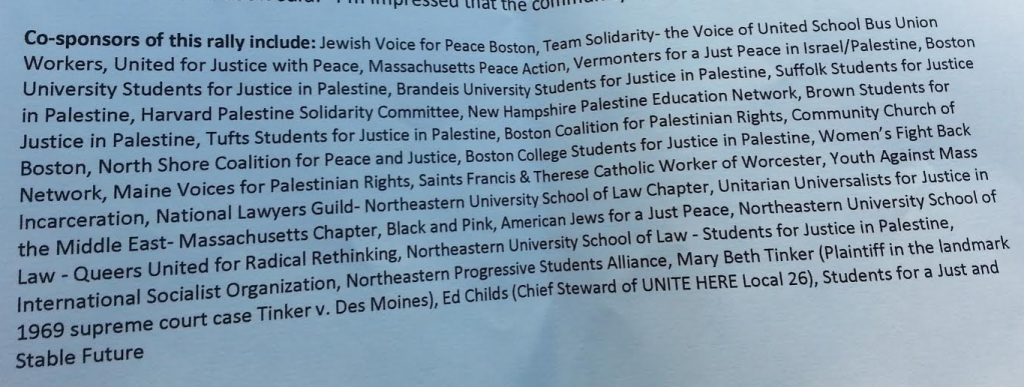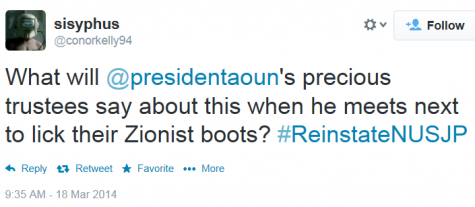Cornell Student Assembly fracturing over Passover BDS push
Assembly member: Assembly President "wants to see 20 year old college students form firm opinions on an issue we know very little about and have no responsibility for"...
Assembly member: Assembly President "wants to see 20 year old college students form firm opinions on an issue we know very little about and have no responsibility for"...
Pushing for final vote next week less than 48 hours after Second Passover Seder...
 The full Resolution linked on the Assembly website is embedded at the bottom of this post. Here's the operative part:
The full Resolution linked on the Assembly website is embedded at the bottom of this post. Here's the operative part:
(22) Be it resolved, that Cornell University will further examine its assets for investments in companies that a) provide military support for, or weaponry to, the occupation of Palestinian territory or b) facilitate the building or maintenance of the illegal separation wall or the demolition of Palestinian homes, or c) facilitate the building, maintenance or economic development of illegal Israeli settlements on occupied Palestinian territory, (23) Be it further resolved, that Cornell University will make information about all of its assets public, pertaining especially to its investments, (24) And be it finally resolved, that Cornell University will end its complicity with the Israeli occupation of the Palestinian territories and divest its holdings from the aforementioned companies and any other companies that profit directly from Israeli military occupation in the West Bank and the Gaza Strip. Moreover, Cornell University will not make further investments in companies that materially support or profit from Israel’s occupation of Palestinian territory.Passover starts Monday night, April 14, and many Jewish students at Cornell leave on Thursday to head home for the holidays. If the Resolution is not tabled on Thursday, the Resolution will come to a formal vote on the following Thursday, April 17, in the middle of Passover, just a day after Jewish students return to campus after Passover Seders. By so scheduling the Resolution, SJP and its supporters in the Student Assembly have sought to put Jewish students and campus groups at a disadvantage, literally forcing them to choose between celebrating the Jewish People's Exodus from slavery in Egypt or organizing to fight the Divestment Resolution.
Facilities Commissioner Armen Hadjimanoukian of the Bruins United slate, Community Service Commissioner Omar Arce, an independent councilmember, and General Representative Lizzy Naameh of the LET’S ACT! slate sponsored the resolution.... In a second straw vote later in the meeting, no councilmembers changed their vote. Student Wellness Commissioner Savannah Badalich, Naameh, External Vice President Maryssa Hall, Cultural Affairs Commissioner Jessica Trumble and Arce still said they would support the resolution.Arce not only sponsored the resolution, he also endorsed a letter claiming "Islamophobic commentary" in opposition to the divestment resolution necessitated a "Diversity Requirement." The Daily Bruin reports that Arce has been arrested on charges of false imprisonment related to alleged sexual batteries:
An undergraduate student council member was arrested by university police Wednesday on a charge of false imprisonment. On Wednesday, a female student reported a series of sexual batteries between October and March. The report led to 21-year-old Omar Arce’s arrest, according to a police report released Thursday afternoon. UCPD arrested Arce, the Undergraduate Students Association Council Community service commissioner and a fourth-year international development studies student, at 10:47 a.m. Wednesday and transported him to the Los Angeles County Sheriff’s Department in West Hollywood. Arce was booked about 11:30 a.m. on $50,000 bail. He is currently being held at the Men’s Central Jail in downtown Los Angeles.The local Fox affiliate further reports on the arrest:
Joins California ASA Chapter in bucking national organization...
"When the head of the Jewish Studies program at a prestigious college can support the BDS, I feel like I've stepped through the Looking Glass."...
Heavy racial overtones as Israel class picketed, Professor forced to walk protest gauntlet, Jewish students heckled and mocked....
I apologize to any student who has been personally affected by this issue. The issues raised in the resolution extend thousands of miles beyond Ann Arbor, MI, and no student government resolution can bring about any sort of solution. But for thousands of students on this campus, the issues raised are intensely personal and hit close to home. We can, and should, do more so that students can voice their concerns and be listened to, even and especially by those who disagree with them. We should do more so that students feel safe describing their views and sharing their experiences.Translation: The divestment motion will be brought up again tonight, starting at 7:30 p.m. The viciously anti-Israel Max Blumenthal and Ali Abunimah apparently are making special appearances to argue in favor of divestment. We'll track what happens and let you know.
We previously reported how Roger Waters, formerly of Pink Floyd, is spearheading the movement to prevent musicians from appearing in Israel, even using a fake Gandhi quote as justification. One of the groups subject to boycott pressure is the Rolling Stones. In a blow to the boycott...
U.S. academic publishers are key funders of the American Studies Association...
In the furor that exists in the U.S. today about BDS and the right and wrong of a cultural boycott of Israel, a quote from one of my heroes, Mahatma Gandhi, has been on my mind. He prophetically said, “First they ignore you, then they laugh at you, then they fight you, then you win.” The BDS movement is fulfilling its promise and fits Gandhi’s description. Once dismissed by many as a futile strategy that would “never work,” BDS has gained much ground in recent weeks, bringing with it the expected backlash. .... I think it’s safe to say BDS is in the “then they fight you” stage.This is a common quote used by the BDS movement. The anti-Israel Mondoweiss website used it, as has a Northeastern Students for Justice in Palestine Facebook commenter and a commenter at the anti-Israel Electronic Intifada. This student at the recent Northeastern University anti-Israel protest used it to fire up the crowd: The only problem is that it's a fake quote. All available evidence is that Gandhi never said it, as The Christian Science Monitor noted in 2011, Political misquotes: The 10 most famous things never actually said:
Intellectual honestly and consistency are difficult things for BDS academic boycotters...
 The expectation was that there would be a mass rally.
It didn't turn out that way. There were at most about 200 protesters according to participants.
It's pretty obvious from photos and video that many if not most of the protesters were not even students, but a coalition of local (and rather aged) activists and some union members with gripes unrelated to Israel:
Calling the President of Northeastern a "Zionist Goon," as reflected in the video, was bad enough, and was typical of the attacks.
The expectation was that there would be a mass rally.
It didn't turn out that way. There were at most about 200 protesters according to participants.
It's pretty obvious from photos and video that many if not most of the protesters were not even students, but a coalition of local (and rather aged) activists and some union members with gripes unrelated to Israel:
Calling the President of Northeastern a "Zionist Goon," as reflected in the video, was bad enough, and was typical of the attacks.
 Chanting "Long Live the Intifada" was much worse. The Second Intifada alone caused the deaths of approximately 1000 Israelis and 3000 Palestinians.
Supporters of Venezuela and the Hugo Chavez socialism agenda were handing out flyers:
Chanting "Long Live the Intifada" was much worse. The Second Intifada alone caused the deaths of approximately 1000 Israelis and 3000 Palestinians.
Supporters of Venezuela and the Hugo Chavez socialism agenda were handing out flyers:
Donations tax deductible
to the full extent allowed by law.
Founder
Sr. Contrib Editor
Contrib Editor
Higher Ed
Author
Author
Author
Author
Author
Editor Emerita
